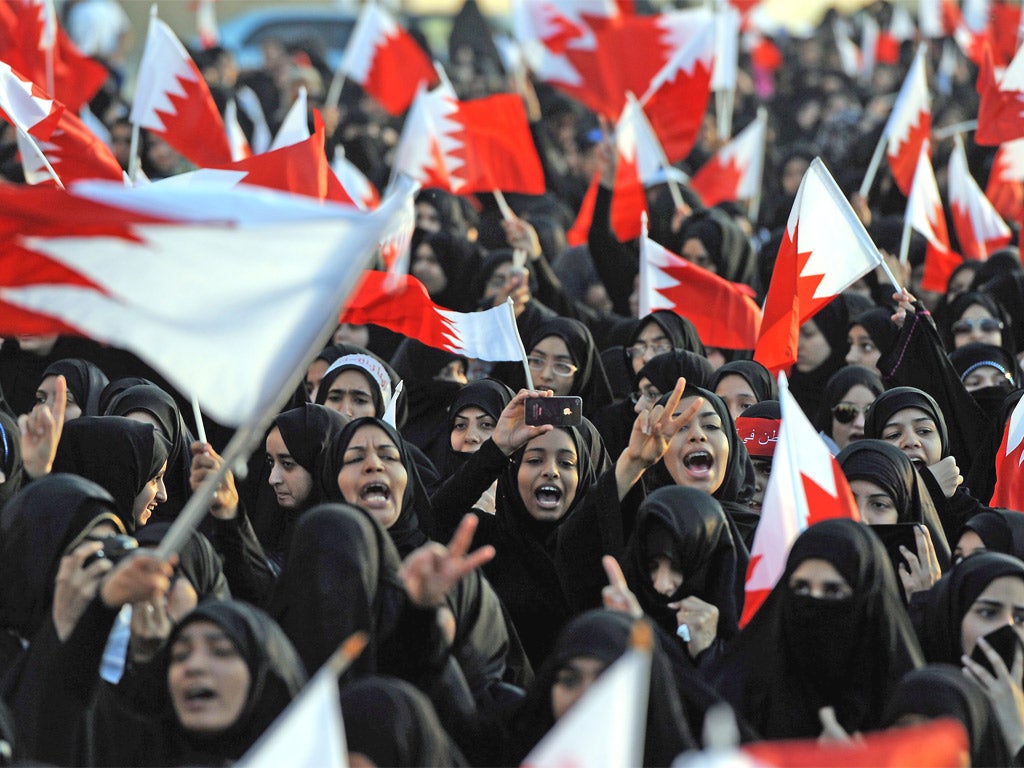Bahrain's rulers split over fate of rights activist
Shadow hangs over Formula One race as hardliners block hunger-striker's release

Your support helps us to tell the story
From reproductive rights to climate change to Big Tech, The Independent is on the ground when the story is developing. Whether it's investigating the financials of Elon Musk's pro-Trump PAC or producing our latest documentary, 'The A Word', which shines a light on the American women fighting for reproductive rights, we know how important it is to parse out the facts from the messaging.
At such a critical moment in US history, we need reporters on the ground. Your donation allows us to keep sending journalists to speak to both sides of the story.
The Independent is trusted by Americans across the entire political spectrum. And unlike many other quality news outlets, we choose not to lock Americans out of our reporting and analysis with paywalls. We believe quality journalism should be available to everyone, paid for by those who can afford it.
Your support makes all the difference.The Bahraini royal family is divided over whether to free a jailed human rights leader, Abdulhadi al-Khawaja, who has been on hunger strike for more than 60 days. A Bahraini source said yesterday: "They were going to release him three weeks ago but this was vetoed by hardliners in the family."
The hunger strike by Mr al-Khawaja, who says he will starve himself to death if he is not released from prison, has revived opposition to the al-Khalifas in recent weeks. Shia Muslims are angered by the government's effort to portray this Sunday's Formula One Grand Prix as a symbol of Bahraini national unity at a time when there are nightly clashes between the police and protesters. There are calls for a boycott of the race, but organisers are pressing ahead.
Amnesty International, meanwhile, has warned that the regime has failed to follow through on its promises of reform. In a 58-page report it says: "The authorities are trying to portray the country as being on the road to reform, but we continue to receive reports of torture and use of unnecessary and excessive force against protests."
It adds that no senior member of the security force has been held responsible for the mass torture of prisoners last year. Earlier this week, the Brussels-based International Crisis Group (ICG) similarly warned that Bahrain was "a timebomb" and that Mr al-Khawaja's death would spark an anti-regime upsurge. Contrary to the government's claim that life in Bahrain is normal, the ICG says that "beneath a façade of normalisation, Bahrain is sliding towards another eruption of violence".
Over the past year, official Bahraini policy has veered between promises of radical change, accompanied by continuing repression. This reflects differences within the upper ranks of the royal family that have been apparent since pro-democracy protests began during the Arab Spring in February last year. Talks with the opposition about reform were held by Crown Prince Salman bin Hamad al-Khalifa, but were aborted when a Saudi-led military entered the island on 14 March last year. The next day, Bahraini security forces launched a savage onslaught against the regime's opponents and critics.
The most powerful members of the hardline faction in al-Khalifa family are Khalifa bin Salman al-Khalifa, the Prime Minister for 40 years, and two brothers, Khalid and Khalifa bin Ahmed al-Khalifa, respectively, the Royal Court Minister and the army commander. Opponents say there will be no reform so long as these three hold their jobs.
A spokesman for the Bahraini government declined to comment yesterday. Britain and the US have played down the brutality of repression in Bahrain and have given public credence to promises of reform. But they are embarrassed by the contrast between their outrage at human rights violations in Libya and Syria and their tame utterances about Bahrain. They have tried to increase the influence of King Hamad bin Isa al-Khalifa and Crown Prince Salman, but they realise that Bahrain is under Saudi influence.
What they say: Why Sunday's race 'must go on'
Bernie Ecclestone, chief executive, Formula One
"I'm happy our position is quite clear. We don't get involved in politics in a country. There's nothing happening. I know people here, it's all very peaceful."
Ross Brawn, principal, Mercedes team
"We have to take the advice of people who have all the information. We have reassurances from the FIA that we can have a safe race."
Sebastian Vettel, driver, Red Bull
"I think it is safe enough to go and we should go there and race and not worry about something that is not our own business."
Jenson Button, driver, McLaren
"I look to the governing body to decide whether we go to Bahrain or not. I don't know all the facts, hopefully they can make the right call."
International Automobile Federation (FIA)
"Based on the information the FIA has, it is satisfied that all the proper security measures are in place for the running of an F1 World Championship event."
Damon Hill, former F1 world champion
"Human rights organisations have had their cases heard. No one is under any illusion. But we also have a responsibility to our fans."
The BBC, which will be broadcasting the Bahrain Grand Prix
"As the race has been officially sanctioned by the FIA, we will cover the event as part of our contractual obligations."
Join our commenting forum
Join thought-provoking conversations, follow other Independent readers and see their replies
Comments